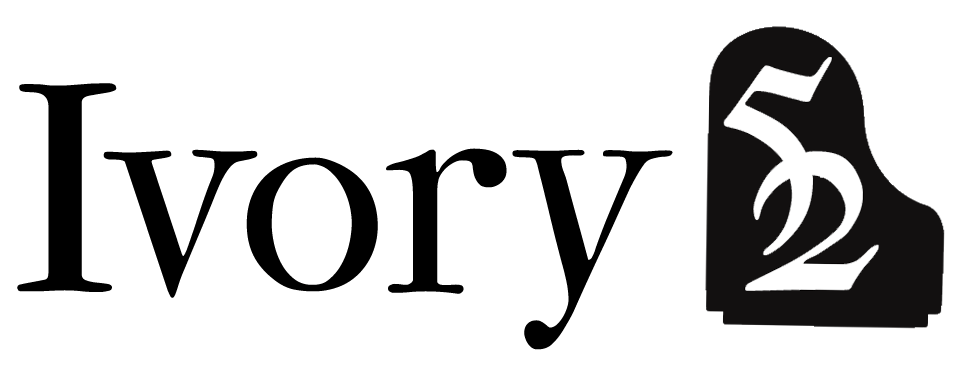Professional piano services for everyone. Ivory52 is dedicated to providing exceptional service to clients in schools, churches, recording studios, residential and performance venues.
Piano Care
Learn about the care your piano needs but doesn't always get
Taking proper care of your piano is essential to ensure its longevity and maintain its exceptional sound quality. However, many piano owners often overlook or neglect certain aspects of maintenance, causing potential harm to their instrument. To simplify the process and help you prioritize the care your piano needs, we have compiled a list of essential practices.
-
Dust and dirt can accumulate on your piano's exterior as well as inside, affecting its performance if ignored. Use a soft, lint-free cloth to clean the surface of your piano regularly. Be cautious while cleaning around the keys, ensuring no liquid enters the keyboard.
-
Piano regulation plays a crucial role in maintaining the optimal performance and longevity of your instrument. Meticulous adjustments across the keyboard and internal action parts, improves touch responsiveness and allows musicians to fully express their musicality. Whether it's a grand piano in a concert hall or an upright piano in a household, the art of piano regulation is essential in preserving the instrument's tone quality, precision, and overall musical experience.
Additionally, repair of worn-out or damaged parts prevent further deterioration and ensure that the piano remains in peak condition.
-
Pianos inherently go out of tune due to changes in humidity and regular use. Schedule regular tuning sessions with a qualified piano technician, ideally twice a year, to maintain accurate pitch. Additionally, consider voicing, a process that optimizes the tonal quality of your instrument. Voicing ensures a consistently balanced and rich sound.
-
Pianos are sensitive to changes in temperature and humidity. Extreme fluctuations can cause warping, cracks, or even damage the soundboard. To prevent this, maintain a stable humidity level between 40-50% and keep the temperature around 68-72 degrees Fahrenheit in the room where your piano resides. Consider using a piano humidifier during dry seasons.
-
Where you position your piano can impact its health. Avoid placing it near windows, vents, or direct sunlight, as exposure to heat and drafts can lead to tuning instability and wood damage. Also, keep it away from areas with high moisture, such as kitchens or bathrooms.
-
Yes, playing your piano regularly is an essential part of its care. Consistent use prevents the felt dampers from hardening and maintains the mechanical components in good working condition. Neglecting regular playing can lead to sluggish keys and a loss of tonal quality.
-
Using a cover for your piano when it's not in use can shield it from dust, sunlight, and accidental spills. Additionally, make sure to keep liquids away from the piano to avoid potential damage to the wood, strings, or key mechanisms.
-
While regular care and maintenance are crucial, it's also essential to have periodic check to ensure the instrument is working optimally.
Cleaning
Lost…and found!
Cleaning is important. Dust accumulation absorbs moisture causing the strings to rust and permanent stains to appear on your piano's finish.
When this happens, your piano begins to look dirty, causes long term irreversible damage to important parts, and makes everything even harder to clean as the finish deteriorates.
Here’s a few things you can do:
Dust around as much of the piano case as you can reach - keeping dust down limits how much will settle in becoming increasingly difficult to remove down the road.
Wash the keys with a mild dish detergent mixed with water and a soft microfiber cloth. Keep your cloth DAMP not dripping, and gently rub on the keys as necessary to remove any build up. Dry the keys with a new soft cloth.
Clean the case with a soft cloth and a gentle cleanser.
CAUTION: Some furniture cleaners will create a film on the polyester or lacquer finish. There are special cleaners and polishes that are formulated especially for piano finishes. Cory Care products are formulated specifically for pianos and works very well. Ask me about Cory Care products for your piano needs.
Regulation
Regulate & Repair
Keeping your piano regulated is key for a piano to play well. There are over 10,000 moving pieces inside of a piano. As felt compresses over time, the wood shrinks and swell and the regulation slowly changes from how the manufacturer set it. These changes cause your piano to play with more difficulty, loss of volume control, keys get stuck…you name it. Having these small adjustments made on a regular basis allows your piano to play smoother, better volume control, no sticking keys; allowing you to enjoy your piano every time you sit down to play.
When the regulation adjustments get neglected over long periods of time the action can get worn or have broken parts that need replacing. Replacing parts can get difficult, especially in pianos that haven’t been manufactured in several decades; it becomes costly in both time and money.
Keeping your piano in good regulation and repair prevents unnecessary wear on parts, saves your hard-earned money and also makes for a more enjoyable playing experience.
Humidity
To humidify or not humidify? Is that your question?
Temperature and humidity are the two biggest factors when it comes to your piano and its ability to hold its tuning. The more stable the piano’s environment, the better the tuning will hold.
When seasonal variations in humidity and temperature are substantial, it may be beneficial to have a Piano Life Saver System installed in the piano that can both add moisture to the air (humidify) and remove excess moisture (dehumidify). This combination unit helps maintain a more stable and optimal environment for the piano, protecting it from the detrimental effects of extreme humidity or dryness.
Additionally, installation of an undercover helps to establishes a micro-environment within the instrument providing better tuning stability and overall long-term good health of the wood.





